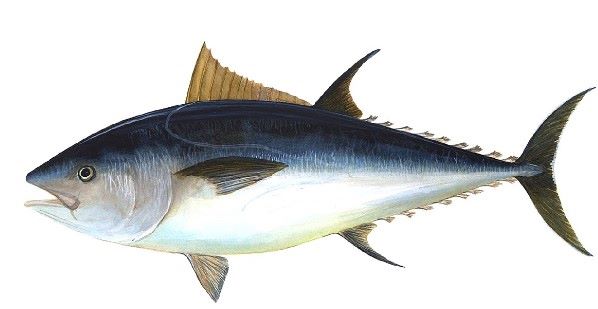

Bluefin tuna is safe to feed to dogs in small amounts as a treat. It is high in protein, omega-3 fatty acids, and other nutrients, which can help keep a dog’s coat and skin healthy, promote muscle development, and support healthy brain, heart, and nerve function. However, excessive intake can lead to mercury poisoning, thiamine deficiency, and hypernatremia due to its high mercury and sodium content.
Bluefin tuna are rich in protein which is essential for muscle development and tissue repair. It also helps keep a dog’s coat and skin healthy. Bluefin tuna is high in omega-3 fatty acids which are good for nerve, brain, and heart health.
Bluefin tuna is a variety of tuna that is high in mercury content which is on a par with shark and swordfish. It can cause mercury poisoning when consumed regularly or excessively. Raw bluefin tuna contains thiaminase, which can cause thiamine deficiency when consumed excessively or regularly. Tuna thrives in saltwater, so it is high in sodium. If fed to dogs frequently, it can lead to hypernatremia (too much sodium in the blood) over time.
Due to its high mercury level, bluefin tuna is not recommended for dogs as part of their regular diet. If given to your dog as a treat, cooked bluefin tuna should be shared in small amounts and only on occasion.
Every dog parent is most likely keen to explore what kind of fish their pup can enjoy, but can dogs eat bluefin tuna? The answer in short is yes, dogs can consume bluefin tuna in small amounts. This type of tuna is also sometimes called northern bluefin tuna, longtail tuna, fall-run tuna, or Atlantic bluefin tuna. Originating from the Northeastern Atlantic ocean, and occasionally the Mediterranean sea, bluefin tuna can be found in much of the world’s waters.
When it comes to the benefits of eating bluefin tuna, protein content plays a key role in keeping a dog’s coat and skin healthy, while also aiding in building and repairing muscles and tissues. Bluefin tuna is also rich in omega-3 fatty acids, which help keep nerves, the brain, and the heart in good condition. However, it is important to be aware of the risks associated with feeding your pup bluefin tuna. The high mercury content of this variety of tuna makes it problematic if dogs eat it excessively or regularly as it could result in mercury poisoning. It's good to note that raw bluefin tuna also contains thiaminase, which can cause thiamine deficiency in canines if consumed regularly or excessively. Besides mercury, one should look out for its high sodium content since this could potentially cause hypernatremia, an unhealthy level of sodium in the blood, over time.
Due to the potential health risks, it's best to keep bluefin tuna off your pup’s regular menu. If you do choose to add it to their diet, opt for cooked bluefin in small amounts, and offer it only occasionally. If you would prefer to offer alternatives, there are plenty of edible fish types out there for your pup to enjoy, such as salmon, whitefish, and cod.
Have you ever tried giving your pup bluefin tuna or other types of fish? What was their reaction? Are there any other types of fish your pup loves that you could recommend to other dog parents? Feel free to share your story in the comments! To all the dogs out there, hope you’re having a lovely day!